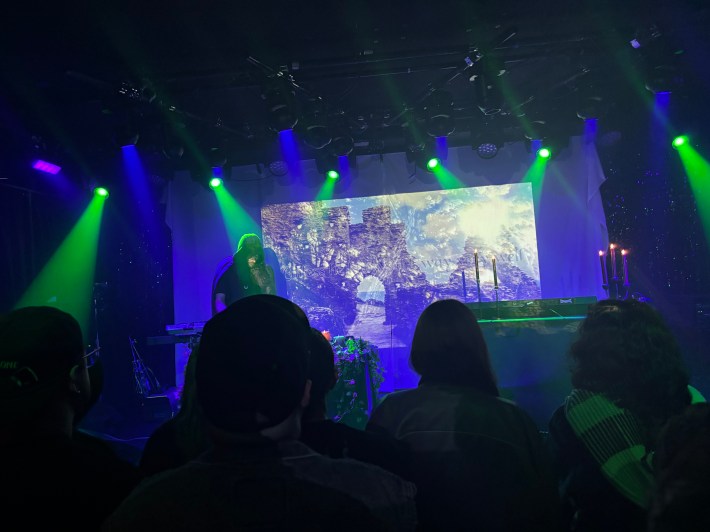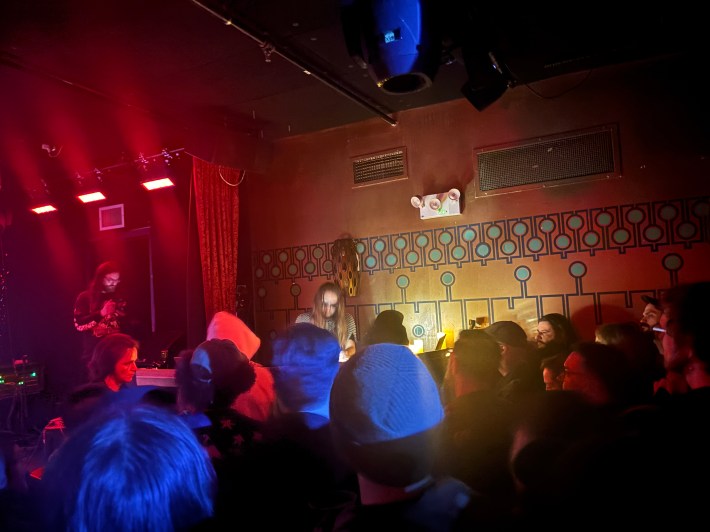At three in the morning on Sunday night, there was a partial solar eclipse in Aries, and then a day later, Neptune entered Aries for the first time in 150 years. As the stars enter Aries, a sign of decisive action, I am preparing myself to take greater charge of my own destiny. That Sunday night, before these transits started, I found myself in the back room of a bar in Ridgewood, wearing elf ears and bobbing my head to the sounds of a synthesized glockenspiel.
Dungeon synth is a small but enthusiastic micro genre of ambient synth music that I stumbled onto through a quirk of the YouTube algorithm. I had been listening to a cover of “Birds of a Feather” by Billie Eillish re-imagined as a song by a medieval bard when the next video, a dungeon synth song, transported me even further into fantasy. I described it to my friend who attended this show with me as sounding like medieval chamber music filtered through an aged 90s VHS tape. It is often video game adjacent—the headliner was a band called Quest Master—but just as often the music references the stories of King Arthur, witchcraft, and especially the works of J.R.R. Tolkien. All the musical acts that performed on Sunday night did so with a sense of ritual: no stage banter, no introductions, just poring over their synthesizers, surrounded by fog and electric candles, and then disappearing into the dead of night.

Most of the acts had some level of props or visual component to their set. Steaming Woodlands appeared on a sparse stage, with electric candelabras on the table next to his synthesizers. Malfet wore a hooded cloak and walked onto the stage jangling bells tied to a rope, and later rang a singing bowl; he played his entire set in front of a video collage combining images of forest nature with images of witches and Arthurian myth. I distinctly remember watching J.M. Waterhouse’s painting The Lady of Shalott emerge from a recording of a fairy ring as I let the music envelop me.
Fief, wearing chainmail over his shoulders and aviator sunglasses, played in a corner of the venue, creating a tavern-like atmosphere. As his synthesized glockenspiel broke out into a jaunty tune, the whole venue stomped in rhythm to the beat. Quest Master was loud, each new beat flowing into the next like a stream threatening to carry me away, the bass reverberated throughout my body, a video playing behind him that soared through waterfalls and mountains as I succumbed to a kind of trance.
Just like the transit of Neptune from Pisces into Aries, this night felt transformative for me. TV Eye, the venue where these groups all played, is a small venue in Ridgewood, Queens that was absolutely packed to the brim with people just as enthusiastic about listening to medieval bangers as I was. Many of them were also in costume. I met a fan dressed in a chainmail hood, with a sword strapped to his back and a dead orc’s head made of plastic hanging from a rope on his belt. As the night went on, more and more people wearing chainmail and flower crowns joined the crowd. I was wearing elf ears for the very first time, and as I walked out of the bathroom a fellow patron complimented them. I hadn’t been to a show this intimate and packed since before 2020, when going to a small concert at a bar became a life-threatening activity.
Dungeon synth isn’t a new genre—it’s an offshoot from black metal with some of the earliest recordings dating back to the 90s—but it has grown significantly in the past few years. At the same time as the show in Ridgewood, there was a small dungeon synth festival occurring in Massachusetts called Northeast Dungeon Siege. The two headlining groups, Fief and Quest Master, had played a set at that festival earlier that day. This summer there will be another dungeon synth festival in Texas.
My friend Ryan, who attended the show wearing a newly purchased cloak, told me that last year he had seen Quest Master and only one person dressed up. While those of us dressed as Dungeons and Dragons party members were in the minority, there was a sense in the venue this year that yes, this was an acceptable place to bring out your Renaissance Faire wardrobe. I described it as “LARPing, but for people who fuck,” which was mostly a joke. But there did appear to be a spirit of magic and renewal in the room with us as the bands played. Ryan, just before the lights dimmed and Fief began playing, also called the genre “black metal, but for people who believe in magic.”

The juxtaposition of synthesizers and bardic melodies suggest not a return to an imaginary past, but a new age of myth and magic. It’s the same feeling I get when I see the way that Elden Ring reframes Celtic mythology through the lens of a Japanese role playing game. Unlike the way that fascists reclaim the story of King Arthur and pre-Christian mysticism, dungeon synth does not—cannot—pretend that this is a pure place of tradition that we are coming back to. This is a newer form of witchcraft, one that makes room for the ways that technology can give us new forms of connection and understanding. One of the people I met on Sunday shared my story of stumbling across dungeon synth music through the YouTube algorithm. It also turned out that he’d responded to a post on Reddit about an upcoming dungeon synth show in a converted church that a friend of a friend is putting on.
Supposedly, the transit of the planet Neptune into Aries from Pisces will feel like waking from a collective dream. The last time this happened, America broke out into the Civil War, a conflict that has not truly been resolved. Dungeon synth is a genre that exploded under the dreaminess of Neptune in Pisces—unsurprisingly, a lot of people decided to fiddle around with synthesizers during the global COVID-19 pandemic. But Aries brings these dreams into reality, takes them from the ephemeral space of the internet and into the flesh. Wearing my elf ears and my cardigan adorned with mushrooms, I let this music transport me into a new era—one not marked by my fear of the past but by my eagerness for the future.


